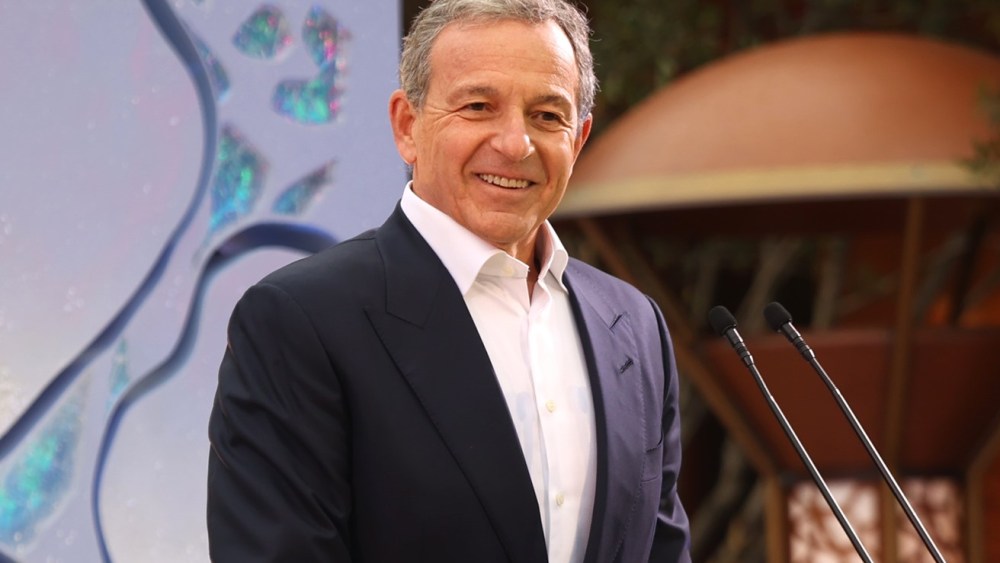Disney CEO talks brand building and maintaining company culture at Canva Create's inaugural event in LA
New technology is a friend, not a foe, to Hollywood's creative community. That was the message Disney CEO Bob Iger conveyed during his keynote address at the Canva Create showcase event held at SoFi Stadium and Hollywood Park on Thursday morning.
Iger, an investor and director of the privately held online design platform, praised Canva for embracing the potential of generative AI tools and other cutting-edge technologies to make premium visual media design tools easily accessible to the masses. Sydney, Australia-based Canva has emerged as a digital media star over the past decade. The company was valued at $40 billion as of 2022, when Iger took the undisclosed stake. The deal came during a two-and-a-half-year retirement from Disney that ended with Iger returning as CEO in November 2022.
Canva Create combines a festival showcasing new features for the Canva platform with a conference exploring creativity and other topics. Thursday's event drew about 3,500 Canva enthusiasts and marked the first time Canva has hosted such a gathering in the United States.
Iger appeared on stage with Canva co-founder Melanie Perkins on YouTube Theater to talk about building a brand, maintaining a strong company culture, and scaling the business. Iger detailed Canva's strength in building intuitive technology and design tools. Pressed by Perkins, Iger reflected on the important role new technology has played in propelling The Walt Disney Company (which celebrated its 100th anniversary last October) through a century.
“Walt Disney himself, early on, was a big believer in using technology to tell better stories, and he thought that technology in the hands of great storytellers was incredibly powerful,” Iger said.
Iger acknowledged that there has been a lot of anxiety in the creative community recently about the potential for generative AI technology to eliminate the need for human labor in content creation, but he argued that this is a misguided view of the potential that can be unlocked by the marriage of cutting-edge technology and visionary creators.
“Rather than focusing on destructive power, [tech’s] “It makes us better, the ability to tell a better story. Not just a better story, but the ability to tell it to more people,” Iger said.
Iger also candidly suggested the company had no choice but to figure out how to make it work for its larger goal of boosting production of movies, TV shows, music and other content.
“You can't get in the way of that. No generation has ever been able to stop technological progress,” Iger said. “What we're trying to do is embrace the change that technology has created and use it as the wind at our back, not as a headwind.”
Perkins encouraged Iger to share with the audience how he ended up investing in Canva. Iger explained that his wife, Willow Bay, dean of the University of Southern California Annenberg School of Business, had used Canva's tools to design an instruction manual for a high-end espresso maker she had given her husband. At first, Iger thought it was a professional-looking manual created by the manufacturer. When Bay introduced Iger to Canva, Iger was impressed with the company's technology and the ethos of empowering creativity that went into the platform.
At Perkins' urging, Iger advised Canva's founders to stay true to the company's core philosophy of simplifying technology tools and helping build an architecture that inspires modern creativity. Iger cited Disney and Coca-Cola as rare examples of American companies that were big in the 1920s, '30s and '40s and still have strong operations and recognizable brands today.
“There's sometimes this idea that you need to change your values to adapt to a changed world,” he says, adding that he disagrees. “Think about how Canva is where it is today, and that you're in business today, because of values that were ingrained in your brand and company culture years ago. That value creation should continue. Abandoning the core values that got you to where you are is what will, in my opinion, lead to the demise of your brand or company.”



